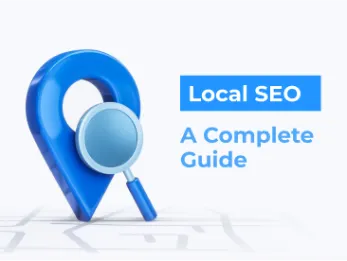A Complete Guide On How To Perform Keyword Research
4 mins | 10 Oct 2022

One of the most important parts of getting the SEO right is "keyword research". It can help improve your searchability for the words that your target audience is searching for online. The keyword research strategy for your business should not just be limited to picking up keywords through your competitor's keyword research, but it is much more than that. Uncovering all the appropriate keywords, conducting keyword analysis, and then concluding with the perfect keywords can ultimately make your website highly searchable.
As you go through this guide further, you will get to know about keyword research, its importance, types, tools, and most importantly, how to conduct proper keyword research. So, let’s commence with understanding what keywords are and what keyword research is exactly, and then we will move forward to other valuable information.
Let's get started!
What are Keywords?
Keywords are words or phrases that can be included in a piece of content to optimize and boost the searchability of a web page, an article, or a blog. The main goal is to increase the generation of traffic to one's website through SERPs, i.e. search engine results pages.
What is Keyword Research?
When it comes to keyword research, is the process of finding the favorable and best keywords that can be included in your content. Formulating the perfect keyword plan with appropriate keyword research and its proper placement in the content is fundamental for promoting the searchability of your content for the targeted audience. It can also be said as a process of understanding & recognizing the language of your target customers that they make use of when searching for relevant products, services, or content. It also encompasses examining, correlating, and prioritizing the best keyword alternatives for your business's website.
Why Has Keyword Research Become So Important In SEO?
The words or phrases that people write in the search bar can be termed as keywords, and the types of keywords you add to your content and the way you choose to add them result in helping Google to understand what kind of questions you want the content to rank in the search results. However, the major purpose of keyword analysis and research is to enable you to target the correct audience with your content.
When your content is optimized with the words & phrases that people are searching for, then your website can rank higher in search results. It's obvious that if your website ranks higher in the SERPs, then it can drive more traffic to your website. That's why finding the right keywords is the first step taken in SEO. In fact, SEO is actually unthinkable without keywords.
7 Types Of Keywords
Short Tail Keywords
Short tail keywords are the keywords that are made of one or two keywords but have high search volume. They are also referred to as focus keywords or head keywords. Short tail keywords tend to have high competition, and they also do not clearly define what specifically the user is searching for.
Long Tail Keywords
Long tail keywords are the ones that are made of more than two or three words, and they can be defined as phrases. They may not have a high search volume when a comparison is drawn between these and short-tail keywords. But, they are more specific.
Mid-Tail Keywords
As the name suggests, mid-tail keywords fall between long-tail & short-tail keywords. Talking about their search volumes, it is moderate, which means it's more than long tail keywords.
Informational Keywords
Informational keywords refer to those keywords that users inquire about to receive more knowledge about a specific product or service. They always have questions starting with 'why', ‘how’, ‘what’ ‘, is it’ etc.
Navigational Keywords
Navigational keywords are those keywords that are used by a prospect when they are searching for an item. Here, the user is well aware of the product and its brand but puts more effort into gaining more information about it.
Commercial Keywords
Now, when internet users are familiar with the brand, they want to know more about the product. Generally, the search query of a prospect swirls around the price and features comparisons with identical items that are sold by competitors
Geo-Targeted Keywords
Geo-targeted keywords are based on the locations and are helpful for local business owners. A usual example of a geo-targeted keyword is — ‘Where can I purchase this {product} in this {location}?
How To Shortlist The Right Keywords?
Here are the factors that one should look for while shooting the keywords for your content:
Keyword Search Volume
Search volume is the cumulative number of searches that a user makes for a keyword. If the search volume is high, then it means it has more potential to generate good traffic to your content. But, even if the search volume is crucial, it should not be the prime factor while performing keyword research for SEO.
CPC Value of Keyword
CPC (Cost-Per-Click) value specifies the value and competition for a keyword to some degree. Keywords that have CPC value are normally difficult to rank for. But, the thing is that they can generate highly relevant traffic with a good opportunity for conversions.
User Intent of a Keyword
To understand the user intent for a keyword, you can examine it by simply performing a Google Search for that specific keyword. You can dig into the types of results you obtain and search for keyword patterns in the search results. The kind of outcomes you receive in SERP will assist you in comprehending the user intent for that particular keyword.
Goals & Objectives
Creating traffic, generating leads, sales, etc., is all you want to achieve from doing keyword research, right? Your goal amounts to something very big for the keyword research and analysis you perform.
Best Keyword Research Tools For Your Business
- Ubersuggest
- Google Trends
- Google Search Console
- Google Ads
- WordStream
- Ahrefs
- Moz Keyword Explorer
- SEMrush
- Soovle
- Serpstat
How To Do Keyword Research?
Here is a simple six-step strategy for how you can move forward with keyword research:
1. Recognize Your Keywords
Firstly, you have to identify an extensive list of keywords that are entirely relevant to your industry, and the words should indicate that the user might be interested in your content. Utilize your wisdom, competitor insights, internal search data, PPC data, analytics data, Google suggest data, and any chronological data you have collected from your client or your company to create your preliminary list of words.
2. Broaden The Keyword List
You can use different keyword research tools to expand your list of keywords and observe the relative search volumes of all the relevant keywords.
3. Classify Your Keyword List
Now that your list is expanded and prepared, it is time to prioritize your keywords and select the most significant ones you think are the best to target with your business campaign. These keywords are the ones that you will need to track rankings on search results. Besides, these keywords should be your first priority when you start with link-building campaigns in a later part of your drive.
4. Organize Your First Concern Keywords
Next, once you have prepared your list of priority keywords for your campaign, you should arrange the keywords into segments that are precise to business objectives. This entitles to more fine reporting and understanding of execution. It would help to organize all your keywords between brand and non-brand. Extra categories might encompass product type, sub-brands, business groups, keyword-based, or keywords that map to a certain business purpose or consumer segment. Categorization makes it possible for team members to understand the consequences that SEO is having at a more significant level.
5. Recognize Preferred Landing Pages
If you have your keywords specified in this way, then the next step can be mapping the priority keywords to obvious pages that they are most applicable to. These pages of your website will be the main target of your optimization actions for your priority keywords.
6. Improve Your Keyword List from Time To Time
It's necessary to pay complete attention to your analytics & PPP data to identify new keywords or phrases that will bring in good opportunities for your company. This is particularly valid for new businesses as well as for sub-brands because it might be like keywords that are driven by seasonal changes. It is a nice method to study these data sets every month to specify any new opportunities that can be incorporated into your business's SEO campaign.
Conclusion
Choosing the perfect keywords for your business can enable you to rank better in SERPs. Remember that it’s more about an objective and driving more traffic to your website. You need to make it super easy and smooth for your customers to find your business on Google and other search engines.
By enhancing your search results for other related keywords or phrases, you can improve your reach to more potential consumers!
Author







